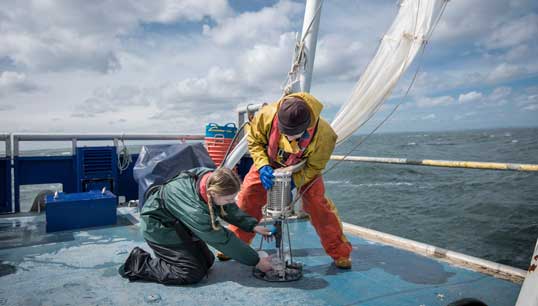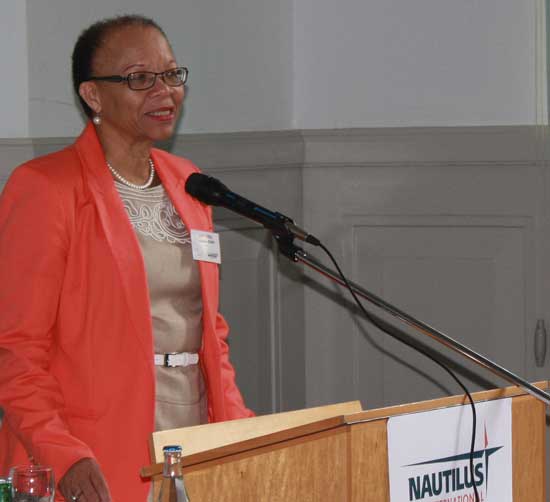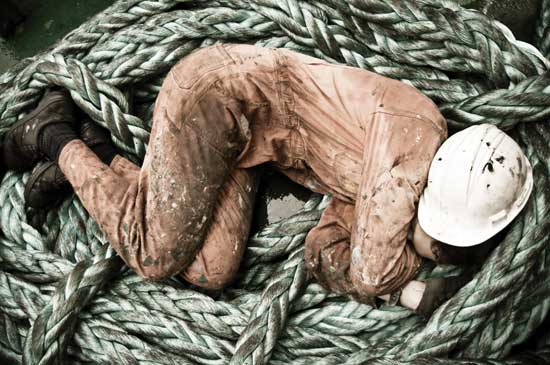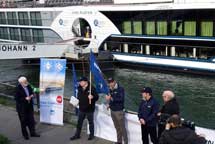- Topics
- Campaigning
- Careers
- Colleges
- Community
- Education and training
- Environment
- Equality
- Federation
- General secretary message
- Government
- Health and safety
- History
- Industrial
- International
- Law
- Members at work
- Nautilus news
- Nautilus partnerships
- Netherlands
- Open days
- Opinion
- Organising
- Podcasts from Nautilus
- Sponsored content
- Switzerland
- Technology
- Ukraine
- United Kingdom
- Welfare

International policy-making depends on good research, and in the shipping industry much of this work is carried out by the World Maritime University – often with the participation of Nautilus members. With the university currently prioritising the need for decarbonisation, Sarah Robinson looks at its teaching and research
There have been so many dramatic events in the news recently that it would be easy to forget the climate crisis, but the World Maritime University (WMU) recognises this as the biggest challenge facing the world today, and has committed substantial resources to helping the shipping industry to decarbonise.
Based in Malmö, Sweden, WMU was established within the framework of the International Maritime Organization (IMO) in 1983 to address a global shortage of well-qualified maritime experts needed for informed decision-making.
WMU is not a nautical training college, but instead offers postgraduate degrees and diplomas for maritime professionals seeking to develop their careers in new directions or take their knowledge to a higher level. The university's academics also carry out vital research to inform maritime decision-making at company, national and international level.
Environmental research at WMU
WMU academics have been working on a number of maritime energy management research projects. They include: a collaboration with the CHEK consortium on decarbonising long distance shipping; an EU Horizon 2020 project investigating the use of decarbonisation technologies including hydrogen and wind propulsion: another Horizon project looking at the decarbonisation of ports; a Nordic Energy research project relating to ammonia and hydrogen as marine fuels; and a Swedish-funded project on the EU Emission Trading System and the impacts of including maritime transport.
'A holistic perspective is essential in order to understand and overcome the decarbonisation challenge,' says Professor Aykut Ölcer, head of maritime energy management. 'WMU's approach is therefore multi-faceted, ranging from technology to human element to regulation to economics.'
Decarbonisation courses at WMU
Maritime professionals who want to be part of the industry's drive to decarbonise have several options to further their knowledge with WMU.
For example, the university's MSc and PhD programmes in Maritime Affairs offer opportunities to focus on maritime energy management. 'The initiative for this maritime energy focus arose from the direct and urgent need to address decarbonisation through the reduction of greenhouse gas emissions as well as the development of sustainable forms of energy in the maritime and ocean fields,' says WMU president Dr Cleopatra Doumbia-Henry.

There is also a Maritime Energy Postgraduate Diploma with particular relevance to Nautilus members. According to WMU, this programme 'equips maritime professionals with technical and socio-economic-environmental knowledge related to IMO regulations on air pollution and potential mitigation measures to achieve a low carbon and energy efficient maritime future'. It is designed for people with a technical profile (e.g. naval architects, deck officers, ship surveyors) as well as professionals with backgrounds such as ship operators and superintendents.
The admissions board will consider applicants who have a minimum of five years' work experience, a bachelor's degree in a relevant discipline and/or have the highest-grade certificate of competency for unrestricted service as master mariner or chief engineer. Students enrolling in the postgraduate diploma programme are usually self-funded or sponsored either by their companies or their maritime administration. In 2022, the maritime consultancy Cetena is offering two 50% tuition bursaries.
The postgraduate diploma is taught by distance learning, but for those wishing to study something similar in Malmö, WMU is this year launching a one week Summer Institute on 'The role of green technologies and capacity-building in maritime decarbonisation'.
In addition, WMU offers short executive and professional development courses on environmental issues which can be tailored to the needs of individual companies.
Nautilus and WMU
Nautilus has a long history of collaborative working with WMU, whether that means formal partnership in research projects, disseminating research findings in the Nautilus Telegraph or inviting Union members to take part in studies.
A notable recent collaboration was when the findings of the WMU Culture of Adjustment report were the focus of a Nautilus International webinar that took place on 5 March 2021. Released in November 2020, the WMU research underlines systemic failures in the implementation of the regulatory regime for seafarers' hours of work and rest.

The Nautilus webinar brought together high-level speakers – including Dr Doumbia-Henry – to address the inconsistencies in implementation of rest/work hours regulations.
Nautilus has also helped to recruit participants for and publicise the findings of recent research projects involving WMU, such as the multi-university study Seafarers' Experiences During the Covid-19 Pandemic.
Opportunities for input from Nautilus members include the work WMU is doing in support of UN Sustainable Development Goal No 8 (Decent Work and Economic Growth). For example, Phase II of the university's Future of Work research recently surveyed maritime professionals to explore issues related to automation and technology. An annual opportunity for participation is the MarTID survey on global maritime training practices.
This is a valuable route for individual Nautilus members to have an influence on international policy-making, so when links become available for members to take part in WMU research surveys, please look out for these in the Nautilus Telegraph and on the Union website.
Nautilus members can have an important influence on international policy-making and are encouraged to take part in research when invited

The fair way to go green
Nautilus International is part of the shipping industry's Maritime Just Transition Task Force, a body created at COP26 in Glasgow last year.
Established at COP26 in Glasgow, the Task Force's founding members include the ITF, IMO, ILO, and the ICS. Its purpose is to ensure that workers' rights and developing economies' access to zero-emission vessels and zero-carbon fuels remain at the centre of policy decisions.
The Task Force has announced that it will launch a report at COP27 in November on the skills needed for a just and equitable green transition in maritime. This report will quantify the number of seafarers who need to be trained or reskilled to handle the green fuels of the future, and the findings will feed into the creation of policy and provide clear steps for the shipping industry to take.

Nautilus's international organiser Danny McGowan is part of the Task Force's Industry Peer Learning Group, which contains national governments, crewing agents, major shipping lines, and international organisations such as the World Bank, and Global Maritime Forum.
'In this Task Force I will stress the importance of social dialogue in the just transition process, and the need for retraining and reskilling,' Mr McGowan says. 'Nautilus is committed to ensuring that skilled and highly experienced maritime workers aren't thrown on the scrapheap or left alone to make the transition to new technologies themselves.'

Task force representation
Nautilus is involved in key industry and union groups where it is important that our members have a voice.
All three branches participate in the European Transport Workers' Federation (ETF) river cruise working group, which provides a platform for unions across Europe to agree what decent working conditions, terms and conditions and pay look like for people in the sector.
Nautilus is also represented on the Cruise Ship Task Force at the International Transport Workers' Federation. Unions representing officers and ratings come together under the ITF banner to discuss cruise industry developments.
The next meeting, which takes place in June, is likely to cover shore leave and ways to ensure seafarers have the same rights as passengers as the industry's post-Covid 'new normal' becomes established. The group will be keen to ensure that terms and conditions achieved for seafarers go back to how they were pre-pandemic, or continue to improve.

Nautilus Federation
What is the Nautilus Federation?
The Nautilus Federation is a group of 22 likeminded trade unions in shipping and inland waterways transport who have come together to improve and expand the services they offer to their members. Nautilus International is a key member of the Federation, with Mark Dickinson as its director and Danny McGowan as coordinator.
Why it is important?
It is important to work together with likeminded unions in order to amplify each other's voices when working on international policies. This serves to strengthen the work of the ETF and ITF to the benefit of all seafarers. In addition, Federation affiliates are always keen to support each other when a fellow affiliate faces problems in their own jurisdiction.
Why it is a good thing for our members?
With the Nautilus Federation working across so many different regions, we know we can count on other unions and their members to keep in mind global impacts of domestic decisions. The Nautilus Federation flagship service is the Joint Assistance and Support Network (JASON), which is supported by the Nautilus 24/7 helpline. Through JASON, the Nautilus Federation facilitates mutual assistance and support for seafarers who are members of a Federation union – especially when legal support is needed after a maritime incident.
Find out moreTags
